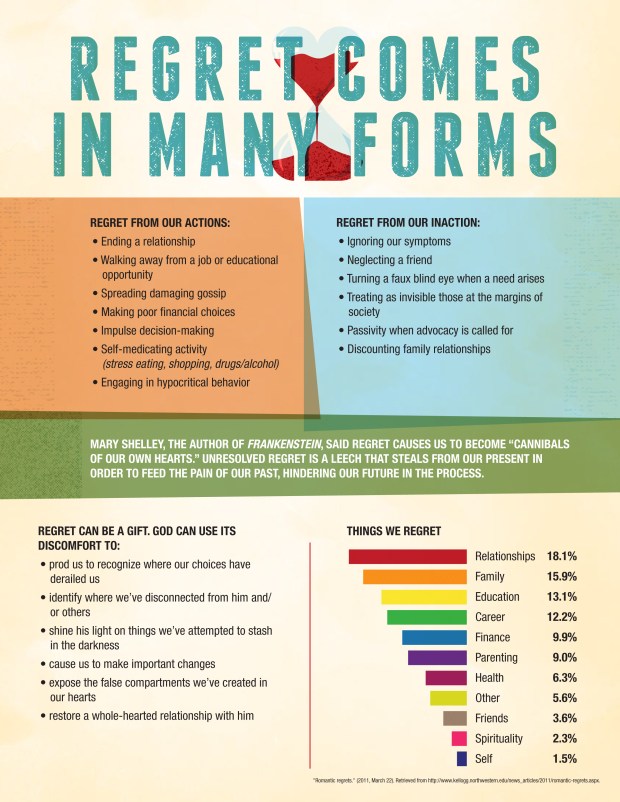Today's interview is with Michelle Van Loon. Michelle is the author of If Only: Letting Go of Regret. She is a writer for Her.meneutics and she blogs at Pilgrim's Road Trip. Today, we talk with Michelle about the sanctifying role of regret, the temptation to take shortcuts, and regret as a tutor.

1) Regret is an interesting theme for a Christian book. You typically see a lot of books on fear or worry, but few on regret. Any reason why?
We sing about how we once were lost, and have now been found by our Savior. Our churches encourage us toward bold faith and celebrate stories of dramatic transformation. These are wonderful realities, but they can leave some of us with the impression that there isn't room in our faith communities to deal with the effects of lingering regrets we're carrying from before we came to faith in Christ. And what of the regrets we've accumulated during the time in our lives when we we've been committed Christians?
Too often, the church's approach to the subject has left those of us struggling with lingering regrets a sense of shame; of shame on our part that we just can't move on already. "You're forgiven … period," some have insisted. "Your regrets should no longer have any power over you now that you're in Christ. Stop wallowing in the past."
If only it were always that simple.
Denying that our regrets exist is a set up for spiritual frustration. It is a recipe for a divided heart. On one side of the divide, the life we think we're supposed to be living; on the other side, our regrets. Christ indeed makes all things new. He is at work to reunite our divided hearts. This means that he will reclaim, redeem, and repurpose every single one of our regrets as we submit ourselves to his work in our lives. But it means facing those regrets prayerfully and with courage, not denying they exist.
Denying that our regrets exist is a set up for spiritual frustration. It is a recipe for a divided heart.
2) Was there a personal crisis of regret that led you to write this book?
A few years ago, it seemed as though I kept having the same conversation with every one of my midlife peers. They would say things like "I wish I could re-do my kids' childhood now that they're leaving the nest," "I should have finished college," "What a mistake it was when I married/divorced," or "If only I would have spent more time with my parents while they were still here."
Spiritual growth at midlife includes coming to terms with the fact that there are no real do-overs in life. I also realized that these deep regrets had the seeds of spiritual growth and potential for maturity sown into them, but few of us seemed to have the tools for processing those regrets well.
I was dealing with my own life list entitled "If Only," and discovered that God could redeem and repurpose my regrets if I was willing to go beyond simply acknowledging that they existed.
I was dealing with my own life list entitled "If Only," and discovered that God could redeem and repurpose my regrets if I was willing to go beyond simply acknowledging that they existed. My own experience and those conversations with my midlife peers sparked my writing, but I realized that the topic had universal appeal. We all have regrets.
3) Seems Christians might be extra prone to regret. Seems the gap between the way Christianity is often sold and the real experience might lead many to be disappointed with Jesus.
We Christians tend to oversell the blessings and benefits of following Jesus, and don't always do such a great job of talking about what it really looks like to count the cost, to pick up the cross. We don't do anyone—including ourselves!—any favors by downplaying the reality that our lives as followers of the risen Christ may be more complicated and challenging than they would be without him. We do not navigate these challenges alone, as he is with us, but nor is our faith a permanent hall pass that lets us zap past the hard stuff.
When we expect that following him might make our lives easier and it doesn't quite work out that way, there's a temptation to do whatever it takes to bring comfort and stability back into our lives, even if it means we take a spiritually-unwise shortcut. Those shortcuts tend to add miles to our journey. When we realize that we're now taking the long road that we begin to feel the weight of the regret we're schlepping with us on that trip.
Those regrets can be a way to come to terms with our own humanity, as well as the depth of Christ's redemption of all that we are, and all that we've done.

4) How does God use regret as a sanctifying tool in our lives?
Regret and remorse both play a role in our transformation. Regret is our awareness of the consequences of an event or action. We experience a sense of loss in the wake of a poor or painful choice we've made as we realize what has followed in the wake of that decision: "I wish I wouldn't have eaten that cold pizza out of the office refrigerator for breakfast because I felt like puking for the rest of the day." Bible teacher Warren Wiersbe summed up the essence of regret with a single question: "Why did I do that"?
Remorse reflects our sense of moral guilt at our own (real or perceived) failure. It speaks to our emotional distress about our choices and has to do with our sorrow over the choice itself, rather than the consequences: "I shouldn't have stolen that cold pizza out of the office refrigerator and eaten it for breakfast because it didn't belong to me."
Remorse and regret bleed into each other in the same way blue and violet merge on a rainbow. It is helpful to understand the distinctions, but it is also important to remember that the two work in tandem in our lives. We do something we regret, and we feel remorse about it. If we act on that remorse, it can lead us forward to a new course of action.
Regret is a tutor that leads us to wisdom.
Regret, on the other hand, is a tutor that leads us to wisdom. We don't get a do-over in our lives. But as we prayerfully process our regrets, we can grow into more whole-hearted, humble, and wise people.
5) If you could give advice to pastors and church leaders as they lead and preach, particularly with regard to regret, what would that be?
My first piece of advice for pastors and leaders is to recognize the areas of regret they may have in their own lives. Pay attention to those regrets, and listen closely to what God is saying to you about them. Sometimes it takes a wise mentor, discerning friend, or counselor to help you listen. Our regrets rarely disappear on their own, so paying attention to them is a way to practice good pastoral self-care.
My second piece of advice for church leaders is to understand that on any given Sunday, some of your congregants are dealing with consequences of earlier bad choices. Others are aching from regret. Individual and corporate confession serves an important role in surfacing some of these regrets. Confession may be a part of your church's weekly worship service. But realize that the way in which you offer absolution or talk about forgiveness in response to confession may be giving some the idea that there is no place for regret in a Christian's life. By sharing stories of God's redemptive activity through regret, you are cultivating a climate in your congregation that makes it safe for people to be truthful about their own experiences, and discover that God can repurpose and renew our regrets for our good and his glory.
Daniel Darling is vice-president of communications for the Ethics and Religious Liberty Commission. He is the author of several books, including his latest, Activist Faith.











